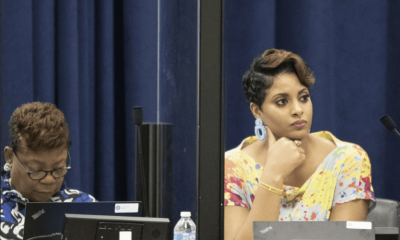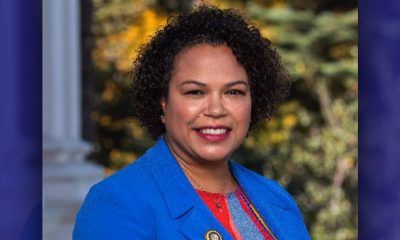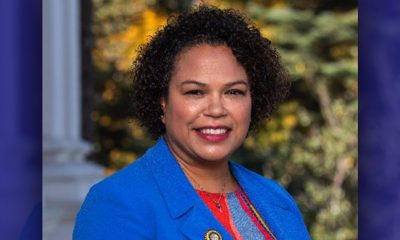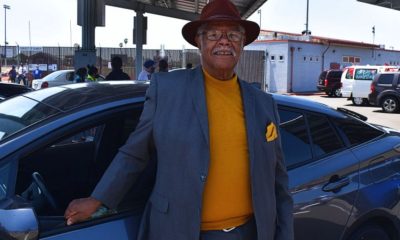#NNPA BlackPress
Why are people still talking about The Mayor of Holly Springs, Mississippi?
NNPA NEWSWIRE — “…I still get chills when I walk inside the Eddie L. Smith Multipurpose Building on North Memphis Street. As one of his final projects, he envisioned it as a common ground for the whole town. How often do you literally get to walk around inside your father’s vision?”
By Lee Eric Smith, lesmith@tsdmemphis.com
Thirty years ago this year, in 1989, my father, Eddie Lee Smith Jr., made history as the first African American elected mayor of my hometown of Holly Springs, Mississippi.
It was a pretty big deal at the time, though when you think about it, it shouldn’t have been. I think most people intrinsically know the color of your skin has nothing to do with your qualifications for the job. It certainly doesn’t measure the impact you leave behind.
My dad died on Jan. 25, 2001, while serving the final months of his final term. That same year, a health fair was named in his honor. A few years later, a street would bear his name. For many years, there was an annual program commemorating the day he was born.
And I still get chills when I walk inside the Eddie L. Smith Multipurpose Building on North Memphis Street. As one of his final projects, he envisioned it as a common ground for the whole town. How often do you literally get to walk around inside your father’s vision?
It says something about the life he lived, that people still want to actively celebrate his life. On the 18th anniversary of his death, my hometown paused for a candlelight vigil, a chance to reflect on the impact he left. As I listened to the stories people told, I realized: Whenever I’m in Holly Springs, I’m always walking around in his vision.
He had a vision that Holly Springs needed a good doctor, preferably African American – not just for health reasons, but so that young people of color could SEE what a career in medicine looks like in the flesh. That’s the pitch he used on Dr. Kenneth Williams, who opened Williams’ Medical Clinic there in the 1990s.
My dad would call on Williams again, this time to prevent the local hospital from closing in the late 1990s. He convinced Williams to purchase the facility, which is now Alliance Healthcare System. No coincidence, Alliance now hosts the Eddie L. Smith Health Fair each May – at the Eddie L. Smith Multipurpose Building.
He also had a vision that Holly Springs should recognize its most famous daughter, Ida B. Wells-Barnett. Though she made her name in Memphis and Chicago, she was born in Holly Springs, where she attended Rust College. When my dad identified the “home house” where she was born, he got the city to acquire the property, then leased it for $1 to what is now the Ida B. Wells Museum.
As mayor, he quickly corrected those who called him a politician. He preferred “elected official” or “statesman;” both of those terms carry a greater sense of service and integrity than “politician.” He remained his own man, turning down political donations if they came with even a hint of strings attached. And his character won him respect from the town’s black and white citizens – even his political adversaries.
“I’m not the black mayor or the white mayor,” he would say. “I’m the Mayor of Holly Springs.”
There are literally too many stories to put here. He was a school principal, a 27-year college administrator, and a Boy Scout leader. He ran for multiple offices in the post-Jim Crow days, as a way to spur African Americans to register and vote. Many credit his work in bringing the Pre-K education program ICS Headstart to Holly Springs. He served on multiple committees in the local and state United Methodist Church.
Like I said: Too many stories. It’s only a mild exaggeration to say that almost everyone in Holly Springs has an Eddie Lee Smith story. Most of them involve him helping them in some way – helping to launch a business (Annie’s Restaurant, for one); being Scoutmaster to Holly Springs’ first black Eagle Scout (Donald Street). There’s the one where he settled down a raucous crowd during a Board of Aldermen meeting by reciting Psalm 23.
For me, of course, he was Dad. It was him playing “old man” basketball against me and my 10-year-old friends – backing us down before unleashing that unstoppable hook shot. We had no chance, even two on one. It was the two of us, remodeling bathrooms and kitchens.
But one of my favorite Eddie Lee Smith stories happened about five years ago. I was in line at Subway when Reggie Burke walked in, still wearing his Holly Springs Parks & Recreation uniform. He’s always friendly with me whenever I see him. On this day, I learned why.
“Lee Eric,” he said as we waited in line, “When I finished high school, I didn’t know what I was going to do next. Your daddy said he could get me on at Parks and Rec, at least until I decided what I wanted to do next. That was in 1990. And I’m still here.
“He saw something in me,” Burke said. “I don’t know if I saw it in myself yet. And I’ve been with the city now for more than 20 years. A whole career . . . because of him.”
That’s when he nodded to the employee making my sandwich. “Put his order on mine,” Burke said.
It was a simple gesture with profound implications. After all, who among us wouldn’t want to live the kind of life where people want to repay your kindness by buying your CHILDREN dinner – YEARS after your death? I hope that someday, someone I’ve helped does the same for Victoria and E.J.
As I look at my own life, I can see he set me on the right trajectory. He was a scout leader; I earned Eagle Scout just shy of my 18th birthday. A year after his election, I made history as the first African American editor of The Daily Mississippian, the student newspaper at Ole Miss. As a child, I watched he and my mom care for both of their parents; years later, I was full-time caregiver for my mom.
It reminds me of a poem I wrote a few years after his death – about the weight of filling the shoes of a man who meant so much to so many people. I wrote about that time after he died, when I literally slipped on an old pair off his shoes, only to find out they’re uncomfortable and worn out. The closing lines:
“As I slipped off his shoes, I cried, as I looked down and realized: I do not have to fill my father’s shoes. For I have inherited his feet.”
#NNPA BlackPress
IN MEMORIAM: Ramona Edelin, Influential Activist and Education Advocate, Dies at 78
NNPA NEWSWIRE — Born on September 4, 1945, in Los Angeles, California, activist Ramona Edelin’s early years were marked by a commitment to education and social justice. According to her HistoryMakers biography, after graduating from Fisk University with a Bachelor’s degree in 1967, she pursued further studies at the University of East Anglia in England. She earned her master’s degree before completing her Ph.D. at Boston University in 1981.
The post IN MEMORIAM: Ramona Edelin, Influential Activist and Education Advocate, Dies at 78 first appeared on BlackPressUSA.

By Stacy M. Brown, NNPA Newswire Senior National Correspondent
@StacyBrownMedia
Once upon a time, Black Americans were simply known as colored people, or Negroes. That is until Ramona Edelin came along. The activist, renowned for her pivotal roles in advancing civil rights, education reform, and community empowerment, died at her D.C. residence last month at the age of 78. Her death, finally confirmed this week by Barnaby Towns, a communications strategist who collaborated with Dr. Edelin, was attributed to cancer.
Born on September 4, 1945, in Los Angeles, California, Edelin’s early years were marked by a commitment to education and social justice. According to her HistoryMakers biography, after graduating from Fisk University with a Bachelor’s degree in 1967, she pursued further studies at the University of East Anglia in England. She earned her master’s degree before completing her Ph.D. at Boston University in 1981.
Edelin’s contributions to academia and activism were manifold. She was pivotal in popularizing the term “African American” alongside Rev. Jesse L. Jackson in the late 1980s.
Jackson had announced the preference for “African American,” speaking for summit organizers that included Dr. Edelin. “Just as we were called Colored, but were not that, and then Negro, but not that, to be called Black is just as baseless,” he said, adding that “African American” “has cultural integrity” and “puts us in our proper historical context.”
Later, Edelin told Ebony magazine, “Calling ourselves African Americans is the first step in the cultural offensive,” while linking the name change to a “cultural renaissance” in which Black Americans reconnected with their history and heritage.
“Who are we if we don’t acknowledge our motherland?” she asked later. “When a child in a ghetto calls himself African American, immediately he’s international. You’ve taken him from the ghetto and put him on the globe.”
The HistoryMakers bio noted that Edelin’s academic pursuits led her to found and chair the Department of African American Studies at Northeastern University, where she established herself as a leading voice.
Transitioning from academia to advocacy, Edelin joined the National Urban Coalition in 1977, eventually ascending to president and CEO. During her tenure, she spearheaded initiatives such as the “Say Yes to a Youngster’s Future” program, which provided crucial support in math, science, and technology to youth and teachers of color in urban areas. Her biography noted that Edelin’s efforts extended nationwide through partnerships with organizations like the National Science Foundation and the United States Department of Education.
President Bill Clinton recognized Edelin’s expertise by appointing her to the Presidential Board on Historically Black Colleges and Universities in 1998. She also co-founded and served as treasurer of the Black Leadership Forum, solidifying her standing as a respected leader in African American communities.
Beyond her professional achievements, Edelin dedicated herself to numerous boards and committees, including chairing the District of Columbia Educational Goals 2000 Panel and contributing to the Federal Advisory Committee for the Black Community Crusade for Children.
Throughout her life, Edelin received widespread recognition for her contributions. Ebony magazine honored her as one of the 100 Most Influential Black Americans, and she received prestigious awards such as the Southern Christian Leadership Award for Progressive Leadership and the IBM Community Executive Program Award.
The post IN MEMORIAM: Ramona Edelin, Influential Activist and Education Advocate, Dies at 78 first appeared on BlackPressUSA.
#NNPA BlackPress
Tennessee State University Board Disbanded by MAGA Loyalists as Assault on DE&I Continues
NNPA NEWSWIRE — Recent legislative actions in Tennessee, such as repealing police reform measures enacted after the killing of Tyre Nichols, underscore a troubling trend of undermining local control and perpetuating racist agendas. The new law preventing local governments from restricting police officers’ authority disregards community efforts to address systemic issues of police violence and racial profiling.
The post Tennessee State University Board Disbanded by MAGA Loyalists as Assault on DE&I Continues first appeared on BlackPressUSA.

By Stacy M. Brown, NNPA Newswire Senior National Correspondent
@StacyBrownMedia
Tennessee State University (TSU), the state’s only public historically Black college and university (HBCU), faces a tumultuous future as Gov. Bill Lee dissolved its board, a move supported by racist conservatives and MAGA Republicans in the Tennessee General Assembly, who follow the lead of the twice-impeached, four-times indicted, alleged sexual predator former President Donald Trump. Educators and others have denounced the move as an attack on diversity, equity, and inclusion (DE&I) and a grave setback for higher education.
Critics argue that TSU’s purported financial mismanagement is a manufactured crisis rooted in decades of underinvestment by the state government. They’ve noted that it continues a trend by conservatives and the racist MAGA movement to eliminate opportunities for Blacks in education, corporate America, and the public sector.
Gevin Reynolds, a former speechwriter for Vice President Kamala Harris, emphasizes in an op-ed that TSU’s financial difficulties are not the result of university leadership because a recent audit found no evidence of fraud or malfeasance.
Reynolds noted that the disbanding of TSU’s board is not an isolated incident but part of a broader assault on DE&I initiatives nationwide. Ten states, including Tennessee, have enacted laws banning DE&I policies on college campuses, while governors appointing MAGA loyalists to university trustee positions further undermine efforts to promote inclusivity and equality.
Moreover, recent legislative actions in Tennessee, such as repealing police reform measures enacted after the killing of Tyre Nichols, underscore a troubling trend of undermining local control and perpetuating racist agendas. The new law preventing local governments from restricting police officers’ authority disregards community efforts to address systemic issues of police violence and racial profiling.
The actions echo historical efforts to suppress Black progress, reminiscent of the violent backlash against gains made during the Reconstruction era. President Joe Biden warned during an appearance in New York last month that Trump desires to bring the nation back to the 18th and 19th centuries – in other words, to see, among other things, African Americans back in the chains of slavery, women subservient to men without any say over their bodies, and all voting rights restricted to white men.
The parallels are stark, with white supremacist ideologies used to justify attacks on Black institutions and disenfranchise marginalized communities, Reynolds argued.
In response to these challenges, advocates stress the urgency of collective action to defend democracy and combat systemic racism. Understanding that attacks on institutions like TSU are symptomatic of broader threats to democratic norms, they call for increased civic engagement and voting at all levels of government.
The actions of people dedicated to upholding the principles of inclusivity, equity, and justice for all will determine the outcome of the ongoing fight for democracy, Reynolds noted. “We are in a war for our democracy, one whose outcome will be determined by every line on every ballot at every precinct,” he stated.
The post Tennessee State University Board Disbanded by MAGA Loyalists as Assault on DE&I Continues first appeared on BlackPressUSA.
#NNPA BlackPress
Braxton Haulcy and the Expansion of Walker|West Music Academy
May 24, 2023 – Walker West Music Academy gets an early start on expansion. Join us for a Wednesday episode of The …
The post Braxton Haulcy and the Expansion of Walker|West Music Academy first appeared on BlackPressUSA.

May 24, 2023 – Walker West Music Academy gets an early start on expansion. Join us for a Wednesday episode of The …
The post Braxton Haulcy and the Expansion of Walker|West Music Academy first appeared on BlackPressUSA.
-

 Activism4 weeks ago
Activism4 weeks agoOakland Post: Week of March 27 – April 2, 2024
-

 #NNPA BlackPress4 weeks ago
#NNPA BlackPress4 weeks agoBeloved Actor and Activist Louis Cameron Gossett Jr. Dies at 87
-

 Community1 week ago
Community1 week agoFinancial Assistance Bill for Descendants of Enslaved Persons to Help Them Purchase, Own, or Maintain a Home
-

 Activism3 weeks ago
Activism3 weeks agoOakland Post: Week of April 3 – 6, 2024
-

 Business1 week ago
Business1 week agoV.P. Kamala Harris: Americans With Criminal Records Will Soon Be Eligible for SBA Loans
-

 Activism2 weeks ago
Activism2 weeks agoOakland Post: Week of April 10 – 16, 2024
-

 Community1 week ago
Community1 week agoAG Bonta Says Oakland School Leaders Should Comply with State Laws to Avoid ‘Disparate Harm’ When Closing or Merging Schools
-

 Community6 days ago
Community6 days agoOakland WNBA Player to be Inducted Into Hall of Fame


























































